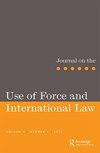领土完整、政治独立和同意:根据禁止使用武力的要求提供军事援助的限制
Q3 Social Sciences
Journal on the Use of Force and International Law
Pub Date : 2020-01-02
DOI:10.1080/20531702.2020.1773178
引用次数: 1
摘要
摘要本文建立在作者先前对《联合国宪章》第二条第四款的机制和解释的研究基础上,该条款试图解释禁令作为不可减损的强制法规范的地位与其公认的“例外”之间的明显矛盾。关于国家同意在禁令中的作用,本文根据这种机械解释,探讨了国家同意在其领土内使用武力的能力的范围和限制,例如,在内战中请求军事援助。最后,该条认为,禁止使用武力仍然适用于国家同意或请求军事援助的情况,因为领土完整和政治独立原则以及“联合国宗旨”仍然可以禁止某些形式的武力,即使有关国家已经同意。本文章由计算机程序翻译,如有差异,请以英文原文为准。
Territorial integrity, political independence, and consent: the limitations of military assistance on request under the prohibition of force
ABSTRACT This article builds upon previous research by the author into the mechanics and interpretation of Article 2(4) of the UN Charter, which sought to explain the apparent contradiction between the status of the prohibition as a non-derogable norm of jus cogens and its well-recognised ‘exceptions’. Turning to the role of state consent within the prohibition, this article explores the scope and limits of a state’s ability to consent to the use of force within its territory – for example, by requesting military assistance in the context of a civil war – in light of this mechanical interpretation. Ultimately, this article argues that the prohibition of force still applies where a state consents or requests military assistance, because the principles of territorial integrity and political independence, alongside the ‘purposes of the United Nations’, can still prohibit some forms of military force even where consent has been given by the state concerned.
求助全文
通过发布文献求助,成功后即可免费获取论文全文。
去求助
来源期刊

Journal on the Use of Force and International Law
Social Sciences-Law
CiteScore
1.10
自引率
0.00%
发文量
13
 求助内容:
求助内容: 应助结果提醒方式:
应助结果提醒方式:


